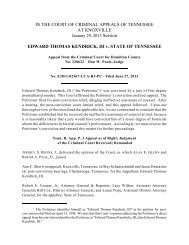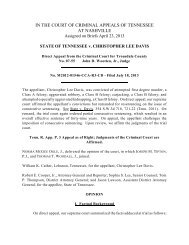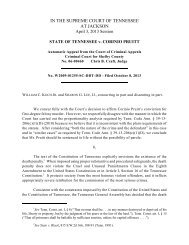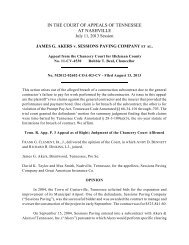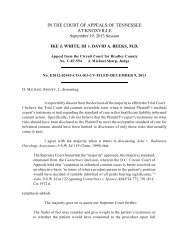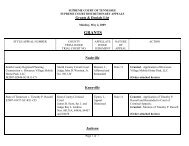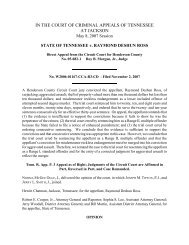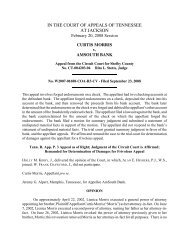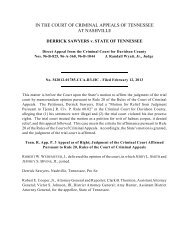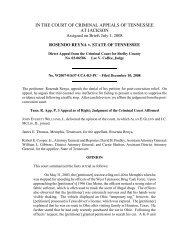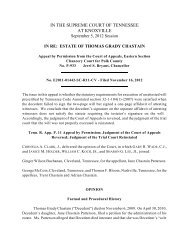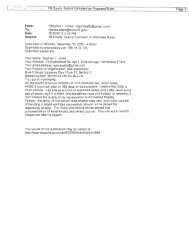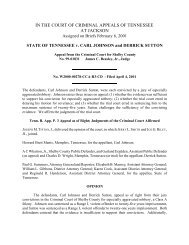Toney Jason Hale v. State of Tennessee
Toney Jason Hale v. State of Tennessee
Toney Jason Hale v. State of Tennessee
Create successful ePaper yourself
Turn your PDF publications into a flip-book with our unique Google optimized e-Paper software.
IN THE COURT OF CRIMINAL APPEALS OF TENNESSEE<br />
AT NASHVILLE<br />
Assigned on Briefs January 18, 2012<br />
TONEY JASON HALE v. STATE OF TENNESSEE<br />
Direct Appeal from the Circuit Court for Bedford County<br />
No. 12237 Lee Russell, Judge<br />
No. M2011-01992-CCA-R3-CO Filed May 23, 2012<br />
In 2004, the petitioner, <strong>Toney</strong> <strong>Jason</strong> <strong>Hale</strong>, pled guilty before the Bedford County Circuit<br />
Court to three counts <strong>of</strong> automobile burglary, a Class E felony. He received an effective<br />
sentence <strong>of</strong> three years as a Range I, standard <strong>of</strong>fender, to be served consecutively to a<br />
previously imposed Marshall County sentence. Seven years later, in 2011, the petitioner<br />
filed a petition for writ <strong>of</strong> error coram nobis, alleging that his convictions violated double<br />
jeopardy protections. The coram nobis court dismissed the petition after a hearing. The<br />
petitioner argues on appeal that the court erred in denying him relief. Upon review, we<br />
affirm the judgment <strong>of</strong> the coram nobis court.<br />
Tenn. R. App. P. 3 Appeal as <strong>of</strong> Right; Judgment <strong>of</strong> the Circuit Court Affirmed<br />
CAMILLE R. MCMULLEN, J., delivered the opinion <strong>of</strong> the court, in which JAMES CURWOOD<br />
WITT, JR., J., joined and JERRY L. SMITH, J., not participating.<br />
Trisha A. Bohlen, Bell Buckle, <strong>Tennessee</strong>, for the Petitioner-Appellant, <strong>Toney</strong> <strong>Jason</strong> <strong>Hale</strong>.<br />
Robert E. Cooper, Jr., Attorney General and Reporter; Mark A. Fulks, Senior Counsel;<br />
Charles F. Crawford, Jr., District Attorney General and Michael D. Randles, Assistant<br />
District Attorney General, for the Appellee, <strong>State</strong> <strong>of</strong> <strong>Tennessee</strong>.<br />
OPINION<br />
Following the petitioner’s March 4, 2004 guilty plea, the trial court entered judgment<br />
on April 16, 2004. On direct appeal, the petitioner challenged the trial court’s decision to<br />
order the sentence in this case to be served consecutively to the sentence arising from his<br />
Marshall County convictions. See <strong>State</strong> v. <strong>Toney</strong> <strong>Jason</strong> <strong>Hale</strong>, No. M2004-01370-CCA-R3-<br />
CD, 2005 WL 1812825, at *1 (Tenn. Crim. App., at Nashville, Aug. 2, 2005). This court<br />
affirmed the trial court’s judgments. Id.
On February 17, 2011, the petitioner filed a pro se petition for writ <strong>of</strong> error coram<br />
nobis alleging that his convictions violated double jeopardy protections. He asserted that his<br />
crimes in Bedford County were committed as part <strong>of</strong> the same criminal episode as his crimes<br />
in Marshall County, for which he had already been convicted and sentenced in a separate<br />
prosecution. Acknowledging that the petition was filed outside the one-year statute <strong>of</strong><br />
limitations, the petitioner asserted that principles <strong>of</strong> due process required tolling because he<br />
“ha[d] only recently come to understand his [double jeopardy] rights.” The <strong>State</strong> filed a<br />
motion to dismiss, arguing that the petition was untimely, did not assert any grounds to toll<br />
the statute <strong>of</strong> limitations, and did not allege any grounds for which relief could be granted.<br />
The court, without ruling on the <strong>State</strong>’s motion to dismiss, appointed counsel and held an<br />
evidentiary hearing.<br />
At the hearing, the petitioner testified that he burglarized a number <strong>of</strong> automobiles on<br />
consecutive dates in Marshall and Bedford Counties. He pled guilty in the Marshall County<br />
Circuit Court to the crimes he committed in Marshall County. After he pled, he was indicted<br />
in this case for the burglaries that he committed in Bedford County. He was represented by<br />
counsel in both cases. The petitioner testified that he believed the Bedford County <strong>of</strong>fenses<br />
should have been prosecuted with the Marshall County <strong>of</strong>fenses.<br />
The statements the petitioner and his accomplices gave to police during the<br />
investigation <strong>of</strong> the burglaries were admitted into evidence at the hearing. In the petitioner’s<br />
statement, he provided a narrative <strong>of</strong> his burglary spree. He described in detail the cars he<br />
burglarized and the items he took from each. He also described the locations <strong>of</strong> the cars,<br />
including both Bedford and Marshall Counties. Also admitted as an exhibit was the<br />
discovery form that the <strong>State</strong> provided the petitioner in the prosecution <strong>of</strong> this case. That<br />
form states, in relevant part:<br />
[T]he Defendant’s prior criminal record is as follows: Defendant’s NCIC<br />
available for inspection upon request.<br />
MARSHALL COUNTY CIRCUIT NO. 15572 – AUTO BURGLARY (16<br />
COUNTS) – 7/9/03 10 YEARS.<br />
1<br />
The petitioner testified that he had seen neither <strong>of</strong> these items since his trial. On crossexamination,<br />
the petitioner testified that he wrote the statement he gave to police and had<br />
been aware <strong>of</strong> its existence since he wrote it in 2003.<br />
1<br />
Because the petitioner pled guilty, he did not have a trial. Nevertheless, “trial” in the context <strong>of</strong><br />
coram nobis proceedings includes a guilty plea proceeding. Wlodarz v. <strong>State</strong>, – S.W.3d –, 2012 WL 581210,<br />
at *7-10 (Tenn. Feb. 23, 2012).<br />
-2-
After the hearing, the coram nobis court dismissed the petition. The court determined<br />
that the petition was time-barred because it was filed outside the one-year statute <strong>of</strong><br />
limitations and that due process concerns did not warrant tolling the statute. The court stated:<br />
I don’t find that there is any great injustice or any injustice, period, in this<br />
situation in requiring a one-year [statute <strong>of</strong> limitations] to apply. He knew<br />
about the statements; he knew where he was prosecuted, out <strong>of</strong> which courts<br />
and counties his sentences were, and for that reason, I don’t believe there’s a<br />
basis for having due process consideration[s] to extend the period <strong>of</strong> time to<br />
file.<br />
The court additionally ruled that the petitioner did not present “any new evidence here or any<br />
other basis for granting Coram Nobis relief.” The court reasoned, “[A]ll along, again, he has<br />
known where the crimes took place and where he was being prosecuted. And he surely knew<br />
about a statement that he had made, whether he forgot about it or not.” The petitioner<br />
subsequently filed a timely notice <strong>of</strong> appeal.<br />
A writ <strong>of</strong> error coram nobis is available to convicted defendants. T.C.A. § 40-26-<br />
105(a) (2006). However, a writ <strong>of</strong> error coram nobis is an “extraordinary procedural<br />
remedy” that “fills only a slight gap into which few cases fall.” <strong>State</strong> v. Mixon, 983 S.W.2d<br />
661, 672 (Tenn. 1999) (citing Penn v. <strong>State</strong>, 670 S.W.2d 426, 428 (Ark. 1984)). “The<br />
purpose <strong>of</strong> this remedy ‘is to bring to the attention <strong>of</strong> the [trial] court some fact unknown to<br />
the court, which if known would have resulted in a different judgment.’” <strong>State</strong> v. Hart, 911<br />
S.W.2d 371, 374 (Tenn. Crim. App. 1995) (quoting <strong>State</strong> ex rel. Carlson v. <strong>State</strong>, 407 S.W.2d<br />
165, 167 (Tenn. 1966)).<br />
Relief by petition for writ <strong>of</strong> error coram nobis is provided for in <strong>Tennessee</strong> Code<br />
Annotated section 40-26-105. The statute provides, in pertinent part:<br />
(b) The relief obtainable by this proceeding shall be confined to errors dehors<br />
the record and to matters that were not or could not have been litigated on the<br />
trial <strong>of</strong> the case, on a motion for new trial, on appeal in the nature <strong>of</strong> a writ <strong>of</strong><br />
error, on writ <strong>of</strong> error, or, in a habeas corpus proceeding. Upon a showing by<br />
the defendant that the defendant was without fault in failing to present certain<br />
evidence at the proper time, a writ <strong>of</strong> error coram nobis will lie for<br />
subsequently or newly discovered evidence relating to matters which were<br />
litigated at the trial if the judge determines that such evidence may have<br />
resulted in a different judgment, had it been presented at the trial.<br />
-3-
(c) The issue shall be tried by the court without the intervention <strong>of</strong> a jury, and<br />
if the decision be in favor <strong>of</strong> the petitioner, the judgment complained <strong>of</strong> shall<br />
be set aside and the defendant shall be granted a new trial in that cause. . . .<br />
T.C.A. § 40-26-105 (b), (c). In the context <strong>of</strong> a guilty plea, the petitioner requesting a writ<br />
to issue must “present newly discovered evidence [showing] that his plea was not voluntarily<br />
or knowingly entered.” Newsome v. <strong>State</strong>, 995 S.W.2d 129, 134 (Tenn. Crim. App. 1998);<br />
see also Wlodarz, 2012 WL 581210, at *7 (approvingly discussing Newsome). “The<br />
decision to grant or deny a petition for the writ <strong>of</strong> error coram nobis on the ground <strong>of</strong><br />
subsequently or newly discovered evidence rests within the sound discretion <strong>of</strong> the trial<br />
court.” Hart, 911 S.W.2d at 375 (citations omitted).<br />
The statute <strong>of</strong> limitations for a petition for writ <strong>of</strong> error coram nobis is one year from<br />
the date the judgment becomes final in the trial court. T.C.A. § 27-7-103; Mixon, 983<br />
S.W.2d at 671. For the purposes <strong>of</strong> a coram nobis petition, a judgment becomes final thirty<br />
days after the entry <strong>of</strong> the trial court’s judgment if no post-trial motions are filed or upon<br />
entry <strong>of</strong> an order disposing <strong>of</strong> a timely post-trial motion. Mixon, 983 S.W.2d at 670 (citing<br />
Tenn. R. App. P. 4(c); <strong>State</strong> v. Pendergrass, 937 S.W.2d 834, 837 (Tenn. 1996)). The <strong>State</strong><br />
has the burden <strong>of</strong> raising the statute <strong>of</strong> limitations as an affirmative defense. Harris v. <strong>State</strong>,<br />
301 S.W.3d 141, 144 (Tenn. 2010) (citing Harris v. <strong>State</strong>, 102 S.W.3d 587, 593 (Tenn.<br />
2003)). The issue <strong>of</strong> whether a claim is barred by an applicable statute <strong>of</strong> limitations is a<br />
question <strong>of</strong> law, which this court reviews de novo. Id. at 144 (citing Brown v. Erachem<br />
Comilog, Inc., 231 S.W.3d 918, 921 (Tenn. 2007)).<br />
Here, the petitioner argues, for the first time on appeal, that the discovery document<br />
introduced at the hearing constitutes new evidence. He maintains that it proves the <strong>State</strong><br />
failed to inform the petitioner <strong>of</strong> the dates <strong>of</strong> the Marshall County <strong>of</strong>fenses, information that<br />
would have alerted the petitioner’s counsel to the double jeopardy problem. According to<br />
the petitioner, this constitutes new evidence which is sufficient to support his coram nobis<br />
petition. He makes no argument on appeal regarding the statute <strong>of</strong> limitations and whether<br />
due process should toll it.<br />
The <strong>State</strong> responds that the coram nobis court properly dismissed the petition. It<br />
asserts that the petition was barred by the statute <strong>of</strong> limitations and that no due process<br />
concerns justify tolling the statute. The <strong>State</strong> also argues that the petitioner has not asserted<br />
any new evidence and that constitutional claims, such as the petitioner’s double jeopardy<br />
claim, are not cognizable in coram nobis proceedings. We agree with the <strong>State</strong> that the<br />
coram nobis court properly dismissed the petition.<br />
We first consider whether the statute <strong>of</strong> limitations barred the petition. Although the<br />
petition was filed outside the one-year statute <strong>of</strong> limitations, due process concerns may toll<br />
-4-
the statute to allow a late-filed petition. Workman v. <strong>State</strong>, 41 S.W.3d 100, 101 (Tenn.<br />
2001). The <strong>Tennessee</strong> Supreme Court has explained:<br />
These due process considerations refer to the principle that “before a state may<br />
terminate a claim for failure to comply with procedural requirements such as<br />
statutes <strong>of</strong> limitations, due process requires that potential litigants be provided<br />
an opportunity for the presentation <strong>of</strong> claims at a meaningful time and in a<br />
meaningful manner.” Burford v. <strong>State</strong>, 845 S.W.2d 204, 208 (Tenn. 1992).<br />
Whether due process considerations require tolling <strong>of</strong> a statute <strong>of</strong> limitations<br />
is a mixed question <strong>of</strong> law and fact, which we review de novo with no<br />
presumption <strong>of</strong> correctness. See Vaughn v. <strong>State</strong>, 202 S.W.3d 106, 115 (Tenn.<br />
2006).<br />
Harris, 301 S.W.3d at 145. In order to determine whether due process concerns require a<br />
tolling <strong>of</strong> the statute <strong>of</strong> limitations, “a court must weigh the petitioner’s interest in obtaining<br />
a hearing to present a later-arising ground for relief against the <strong>State</strong>’s interest in preventing<br />
stale and groundless claims.” Id. (citing Workman, 41 S.W.3d at 103). In weighing these<br />
interests, courts should use the following test:<br />
(1) determine when the limitations period would normally have begun to run;<br />
(2) determine whether the grounds for relief actually arose after the limitations<br />
period would normally have commenced; and<br />
(3) if the grounds are “later-arising,” determine if, under the facts <strong>of</strong> the case,<br />
a strict application <strong>of</strong> the limitations period would effectively deny the<br />
petitioner a reasonable opportunity to present the claim.<br />
Id. (citing Sands v. <strong>State</strong>, 903 S.W.2d 297, 301 (Tenn. 1995)).<br />
In applying this test, we must first determine when the limitations period would<br />
normally have begun to run. The judgments in this case were entered on April 16, 2004, and<br />
the statute <strong>of</strong> limitations would have begun to run thirty days later on May 16. Therefore,<br />
the one-year statute <strong>of</strong> limitations would have expired on May 16, 2005. The petitioner did<br />
not file his petition for a writ <strong>of</strong> error coram nobis until February 17, 2011, almost six years<br />
after the statute lapsed.<br />
Second, we must determine whether the grounds for relief arose after the statute <strong>of</strong><br />
limitations would normally have commenced. The petitioner’s grounds for relief, the alleged<br />
double jeopardy violation, arose when he was prosecuted in this case for the Bedford County<br />
burglaries. Furthermore, the petitioner’s police statement indicates he knew at the time <strong>of</strong><br />
-5-
his arrest that the <strong>of</strong>fenses were committed in both Bedford and Marshall Counties and that<br />
he committed them as part <strong>of</strong> the same spree. Although the petitioner asserts that the<br />
grounds for relief arose only once he became aware <strong>of</strong> the double jeopardy doctrine, this<br />
court has previously stated that “ignorance [<strong>of</strong> the law] does not create a due process avenue<br />
<strong>of</strong> relief.” Gerald Wayne Carter v. <strong>State</strong>, No. W2008-00652-R3-PC, 2008 WL 4922710, at<br />
*2 (Tenn. Crim. App., at Jackson, Nov. 13, 2008); cf. Guillermo Matiaz Juan v. <strong>State</strong>, No.<br />
03C01-9708-CR-00318, 1999 WL 76453, at *1-2 (Tenn. Crim. App., at Knoxville, Feb. 18,<br />
1999) (holding that ignorance <strong>of</strong> law does not justify tolling the post-conviction statute <strong>of</strong><br />
limitations), perm. app. denied (Tenn. July 12, 1999). The petitioner’s grounds for relief,<br />
therefore, arose before the limitations period would normally have commenced. In light <strong>of</strong><br />
this determination, we need not consider whether a strict application <strong>of</strong> the statute <strong>of</strong><br />
limitations would deny the petitioner a reasonable opportunity to present his claim. The<br />
statute <strong>of</strong> limitations barred his petition.<br />
Notwithstanding our conclusion that the petition was filed outside the applicable<br />
statute <strong>of</strong> limitations, we also agree with the <strong>State</strong> that the petition failed to assert subsequent<br />
or newly discovered evidence, which is required for a writ <strong>of</strong> error coram nobis. See T.C.A.<br />
§ 40-26-105(b). Instead, the petitioner asserts only in his appellate brief that newly<br />
discovered evidence <strong>of</strong> alleged inadequacies in the <strong>State</strong>’s disclosure <strong>of</strong> his prior conviction<br />
is sufficient to support his petition. He argues, “[T]he information revealing the criminal<br />
episode was not produced by the <strong>State</strong> and therefore not known to defense counsel at the trial<br />
level. This omission likely caused [the petitioner] to be sentenced again for the same crime<br />
in another county, thus violation [sic] [the petitioner]’s Due Process protections.” The<br />
alleged “omission” to which the petitioner refers is that the date listed on the discovery form<br />
beside his Marshall County <strong>of</strong>fense is the conviction date, July 9, 2003, rather than the<br />
2<br />
<strong>of</strong>fense date, March 10-12, 2003. Initially, we note that the petitioner has waived this issue<br />
for failing to include it in his petition. See <strong>State</strong> v. Turner, 919 S.W.2d 346, 356-57 (Tenn.<br />
Crim. App. 1995) (“A party may not raise an issue for the first time in the appellate court.”).<br />
Waiver aside, we conclude that the discovery form cannot constitute newly discovered<br />
evidence. “To be considered ‘newly discovered,’ the evidence must have been unknown to<br />
the defendant at the time <strong>of</strong> the proceedings giving rise to his conviction.” Wlodarz, 2012<br />
WL 581210, at *12 (citing Harris, 301 S.W.3d at 160 (Koch., J., concurring)). The petitioner<br />
had seen the form at the time <strong>of</strong> his guilty plea. Furthermore, the petitioner knew before he<br />
pled guilty the dates on which he committed the <strong>of</strong>fenses and would have been able to<br />
identify any error on the discovery form. Any alleged error on the form regarding the dates<br />
<strong>of</strong> the <strong>of</strong>fenses, therefore, cannot be considered newly discovered evidence for the purposes<br />
2<br />
The judgment forms for the Marshall County <strong>of</strong>fenses do not appear in the record. We rely on the<br />
petitioner’s pro se petition for the fact that the <strong>of</strong>fenses occurred on March 10-12 and that the conviction date<br />
is July 9.<br />
-6-
<strong>of</strong> pursuing a coram nobis petition. Accordingly, we conclude that the trial court properly<br />
denied the petition on this basis.<br />
Finally, we agree with the <strong>State</strong> that the petitioner’s argument regarding double<br />
jeopardy violations is inappropriate for a writ <strong>of</strong> error coram nobis. This alleged error could<br />
have been litigated in the trial court before the plea and on direct appeal. As a result, it is not<br />
an appropriate issue for a writ <strong>of</strong> error coram nobis. See T.C.A. § 40-26-105(b) (“The relief<br />
obtainable by this proceeding shall be confined to errors dehors the record and to matters that<br />
were not or could not have been litigated on the trial <strong>of</strong> the case, on a motion for new trial,<br />
on appeal in the nature <strong>of</strong> a writ <strong>of</strong> error, on writ <strong>of</strong> error, or, in a habeas corpus<br />
proceeding.”). The <strong>State</strong> further asserts that all claims based on violations <strong>of</strong> constitutional<br />
rights, such as the instant double jeopardy claim, are not cognizable under coram nobis<br />
proceedings because they amount to errors <strong>of</strong> law rather than errors <strong>of</strong> fact. This argument,<br />
however, sweeps too broadly, as some constitutional violations are cognizable under a writ<br />
<strong>of</strong> error coram nobis. See Freshwater v. <strong>State</strong>, 160 S.W.3d 548, 554-56 (Tenn. Crim. App.<br />
2004) (holding that alleged constitutional Brady violations that were not and could not have<br />
been litigated earlier were cognizable in a coram nobis proceeding). But see Jeffrey Scott<br />
Miles v. <strong>State</strong>, No. 03C01-9903-CR-00103, 2000 WL 2647, at *2 (Tenn. Crim. App., at<br />
Knoxville, Jan. 4, 2000) (holding that claims <strong>of</strong> constitutional due process error are not<br />
cognizable under a writ <strong>of</strong> error coram nobis). Here, it is sufficient to adhere to the statutory<br />
principle that coram nobis recognizes claims that “were not or could not have been litigated”<br />
at an earlier proceeding. T.C.A. § 40-26-105(b). Consequently, the petition was properly<br />
dismissed.<br />
CONCLUSION<br />
Upon review, we affirm the coram nobis court’s dismissal <strong>of</strong> the petition.<br />
-7-<br />
___________________________________<br />
CAMILLE R. McMULLEN, JUDGE



